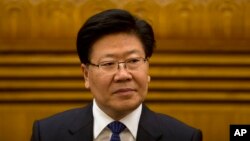Communist Party officials in China's far western Xinjiang region say religious extremism is waning, but the government plans to step up border controls with Central Asian countries to prevent militants from entering the troubled area.
Xinjiang Party Secretary Zhang Chunxian told reporters at China's annual legislative session that cases of violence have declined in the past year but “the struggle will last long term” given complicated international and domestic factors.
Xinjiang is home to the Uighurs, a mostly Muslim ethnic Turkic minority that has chafed at Beijing's heavy-handed rule and restrictions on language and religious practices. Hundreds of people have died in violent attacks that the government blames on militant Islamic separatists.
The central government under President Xi Jinping has introduced a series of measures aimed at bringing stability to Xinjiang, ranging from bolstering police presence and expanding security operations in a campaign called “Strike Hard,” to promoting cultural assimilation through educational and poverty-alleviation programs.
While banning Islamic headdresses or fasting during Ramadan, the government has also launched financial incentives for intermarriage with Han Chinese, the majority ethnic group in China.
Officials said the government will continue both types of tactics this year, as well as continue embedding hundreds of thousands of party cadres in Xinjiang villages in an effort to sway public opinion about the central government.
“We will stick to Strike Hard and high pressure whenever there are terrorist thoughts and in the meantime provide education and persuasion,” Zhang said.
The integration program has been the subject of intense debate within ethnic policy circles in China, with some experts arguing that polices such as enforcing the use of Mandarin - the national language - might exacerbate Uighur resentment while others say an assimilation process, however difficult, must take place before the region will achieve ethnic harmony.
Che Jun, Xinjiang's deputy party secretary, said the government intends to strengthen cooperation with bordering countries to prevent the flow of militants and people leaving the country illegally.
China has argued it has a domestic terror problem, with militants leaving the vast western border to train in bases in countries like Afghanistan and returning to carry out attacks. International human rights groups say many of those who leave the country are refugees fleeing Chinese rule rather than militants.
The border issue came to the fore last year when Thailand deported dozens of Uighurs who had fled China, drawing international criticism from groups including the United Nations refugee agency.




